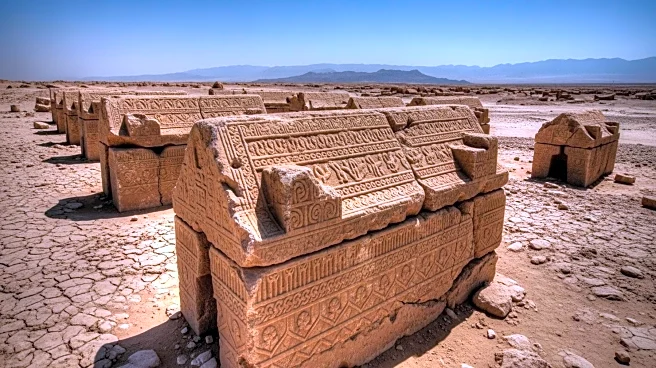What's Happening?
A significant archaeological discovery has been made at Iraq's Mosul Dam, where 40 ancient tombs dating back to the Hellenistic Seleucid period, around 300 BC, have been unearthed. This discovery was facilitated by a substantial decline in water levels at the dam, which is Iraq's largest reservoir. Bekas Brefkany, the director of antiquities in Duhok, led the excavation efforts. The tombs were found in a cemetery near a site identified in 2023, containing ceramic coffins organized with sections for adults and children. The site, believed to be an acropolis, has shown evidence of continuous habitation for about 5,000 years, with pottery finds spanning multiple cultural phases. The receding waters have provided archaeologists with opportunities to explore areas previously submerged, although they also pose risks to these fragile sites.
Why It's Important?
The discovery at Mosul Dam highlights the dual impact of climate change on archaeological sites. While the drought conditions have exposed hidden historical treasures, they also threaten the preservation of these sites. This situation underscores the broader implications of climate change on cultural heritage, as receding waters can both reveal and endanger ancient artifacts. The findings contribute to our understanding of historical human settlements and cultural transitions in the region, offering insights into the social context of past civilizations. The tombs will be preserved and displayed at the Duhok National Museum, providing valuable information for future research on ancient societies.
What's Next?
Further excavations are planned, with ten teams from international universities and museums scheduled to visit the Dhi Qar region in October. These efforts aim to uncover more artifacts and gain deeper insights into the historical significance of the site. Researchers hope to explore causes of death, family ties, and social contexts of the burials. The ongoing archaeological work will continue to balance the opportunities and risks presented by climate-induced changes in water levels, striving to protect and study these ancient sites.
Beyond the Headlines
The discovery raises ethical and preservation challenges, as climate change continues to impact archaeological sites globally. The need for sustainable strategies to protect cultural heritage from environmental threats is becoming increasingly urgent. This situation also highlights the importance of international collaboration in archaeological research, as diverse teams work together to uncover and preserve historical artifacts.









